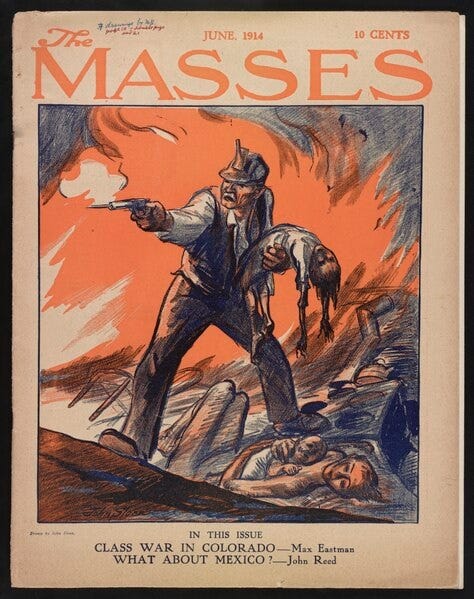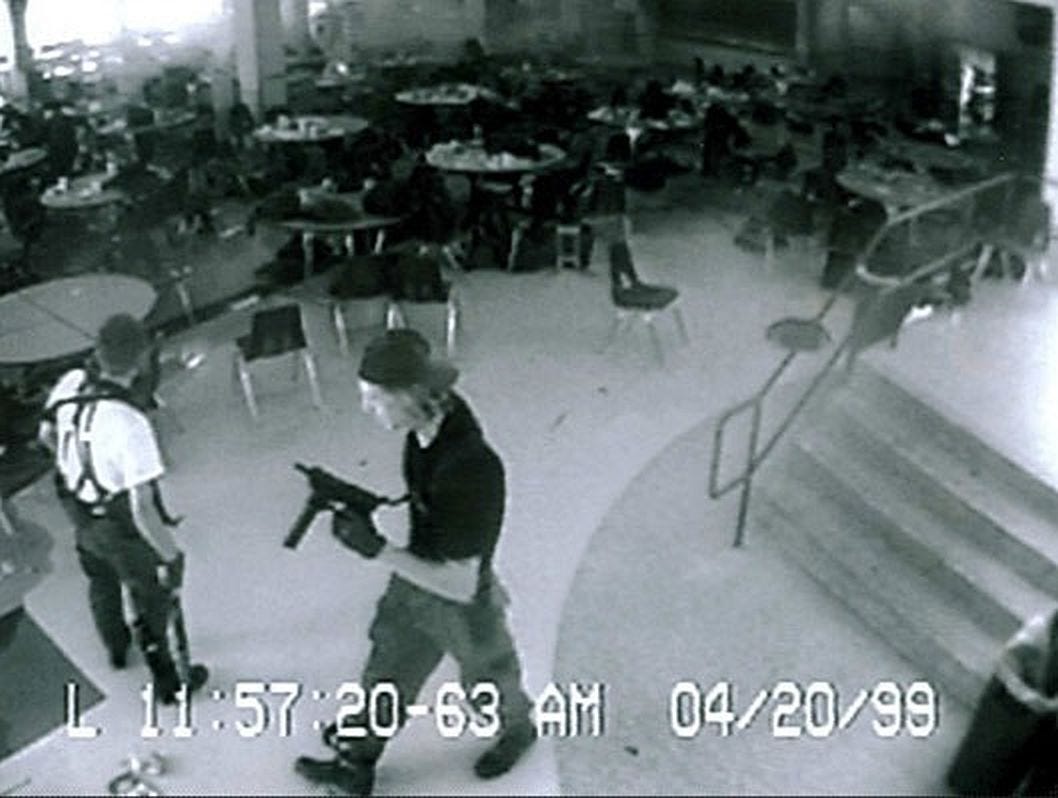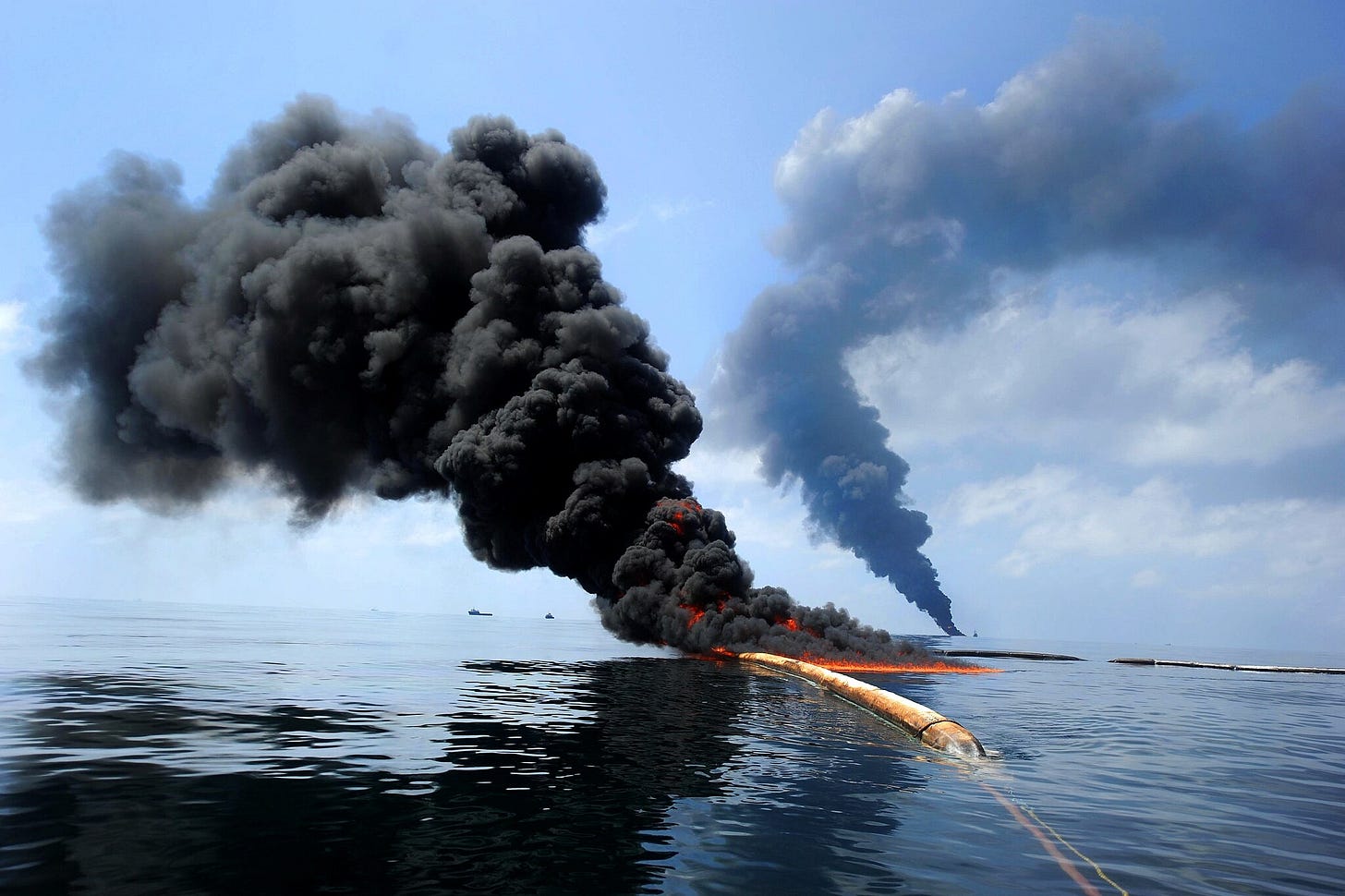“Those who cannot remember the past are condemned to repeat it.” — Spanish-American philosopher George Santayana, 1905
1914 — Rockefeller Hires Thugs to Kill Striking Coal Miners and Their Families
public domain image from wikimedia commons
On this day in 1914, one of the most shocking and shameful crimes in the history of the United States was committed. The perpetrators were paid by a wealthy man (John D. Rockefeller) to carry out their horrendously wicked deeds, and none of them were charged with a crime. But a crime it was: the slaughter of men, women, and children by gunfire and literal fire.
Coal miners in Colorado were on strike. The miners and their families were living together in tent colonies. Rockefeller’s people hired “private detectives” to attack them. They did so with rifles and Gatling guns (early machine-gun-type weapons). The miners fought back. Roosevelt then went to the Colorado Governor, asking him to use the National Guard to bust the strike (by literally busting the strikers).
When the government forces arrived on the scene, the miners welcomed them, thinking they had been sent to protect them. The opposite was the case, though — the G-man beset the largest tent colony, comprised of 1,000 miners, their wives, and their children. During the firefight that ensued, the women and children took refuge in pits dug beneath their tents.
When it got dark, the government agents crept up to the tents, lit them on fire, and then shot the tent-dwellers when they emerged to escape the flames. The next day, the bodies of eleven burned children and two women were found in one of the pits.
This became known as “The Ludlow Massacre.” Although many Americans were outraged by it, nevertheless the strike was broken after more government forces were brought in as reinforcements. The miner’s Union was not officially recognized, nor were the miners’ wages and working conditions markedly improved. Meanwhile, Rockefeller reclined in his rocker, smoking a stogie (figuratively speaking, anyway).
At the time, Rockefeller had $900 million (the modern-day equivalent of $200 billion) at his disposal.
Sixty-six humans of all ages and both genders were killed during the strike, yet none of the attackers ever had to legally answer for his part in the unspeakable mayhem.
public domain images from wikimedia commons
Questions: Although Rockefeller was “worth” $200 billion, what was his true worth as a human being? How much money could Rockefeller have saved (not to mention his soul and conscience [presuming he had one in working condition]) had he simply done the decent and fair thing by paying the miners a living wage? Have you heard Woody Guthrie’s song Ludlow Massacre? Have you read Upton Sinclair’s novel King Coal?
1999 — Columbine School Shooting
public domain image from wikimedia commons
In Littleton, Colorado, on this date in 1999, two high school students murdered twelve of their classmates and a teacher in the span of 16 minutes. As if thirteen deaths were not enough, the teen terrors wounded another 23 physically, and countless more mentally and emotionally.
It could have been worse, though: the two partners in atrocity had planned to set off bombs in the school, killing hundreds, and then shoot the fleeing students as they emerged from the school. But since their propane bombs were duds, they entered the school, guns blazing. After killing the thirteen innocents, the deranged duo turned their weapons on each other and committed assisted mutual suicide.
In the aftermath of the bloodbath, gun control was debated but, as always in such cases, not much became of it. Being able to own whatever type of guns they want remained more important to a large group of people than protecting children, and making money off those people the most vital thing of all to many gun manufacturers and -dealers.
This horrific event continued a terrible trend began the previous year: from 1998 to 2017, there were an average of 11 school shootings per year (one for every 17 school days); one of these tragic events occurred in 2012 in Newtown, Connecticut, where the evil-incarnate perpetrator killed 27 people (not counting himself, which was arguably justifiable), including 20 first-graders (a demographic especially close to my heart). Then, starting in 2018, the numbers accelerated even further. Just naming a couple of individual instances, in 2018, Parkland, Florida suffered 17 killed, and in Uvalde, Texas in 2022, twenty-two.
According to the chart below, 2018 was the first year with more than 100 casualties; since then, there’s only been one year without at least 100 killed or wounded (in 2020 there were “only” 74 casualties, but there weren’t a lot of school days that year, due to the COVID pandemic).
chart above from https://k12ssdb.org/all-shootings
Questions: Why do some people put their “rights” or monetary profit above the safety of children? Why do too many politicians lack the moral fiber, backbone, empathy, intestinal fortitude, and righteous indignation to dig in their heels on this issue? Besides gun control, what can be done to protect the children?
2010 — Deepwater Horizon Explosion and Oil Spill
public domain image from wikimedia commons
On this date fifteen years ago (2010), an oil rig fifty miles off the Louisiana coast exploded. Eleven people died and 17 were seriously injured (almost one quarter of the crew becoming casualties).
Also, literally tons (nearly five) of oil gushed up from sea floor into the Gulf of Mexico before the exploratory well was able to be capped three months afterward. It is the largest offshore oil spill in U.S. history (so far).
Two days after the explosion, the $350 million, longer-than-a-football-field oil rig sunk a mile-and-a-half to the bottom of the Gulf.
Oil reached the shores of Alabama, Florida, Louisiana, and Mississippi, doing damage to the fishing industries there, tourism and, worst of all, the wildlife.
Investigations showed that BP (British Petroleum, the owner/operator of the well) was guilty of negligence and even manslaughter. Besides the lost revenue from the escaped oil, loss of their oil rig, and so forth (boo hoo), the mega corporation was ordered to pay over $20 billion in fines. The U.S. government was also found to be at fault for its insufficient regulating efforts.
Questions: Did BP ever fully pay the fines imposed on them, or was the news that they were ordered to do so enough to satisfy the masses, as they turned their attention to other, more recent, disasters? Is the U.S. government planning on increasing, or decreasing, regulation of the oil industry?
Read about “The Secret Lives of Kids” here.











